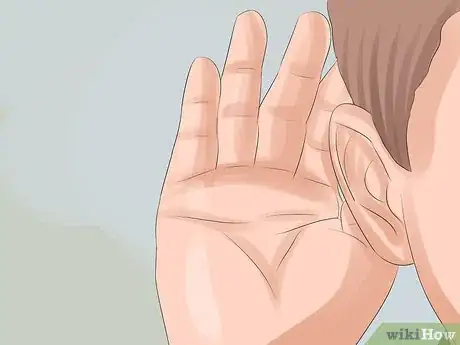X
This article was co-authored by Lauren Urban, LCSW. Lauren Urban is a licensed psychotherapist in Brooklyn, New York, with over 13 years of therapy experience working with children, families, couples, and individuals. She received her Masters in Social Work from Hunter College in 2006, and specializes in working with the LGBTQIA community and with clients in recovery or considering recovery for drug and alcohol use.
This article has been viewed 47,928 times.
It takes a lot of courage for people in the LGBTQ+ community to come out to family, friends, peers, etc., but it can also be difficult to know how to react to someone coming out to you.
Steps
Method 1
Method 1 of 5:
Understanding
-
1Listen well.[1] They've probably been holding back their feelings for quite a long time, so it's important to allow them to let it out. Be compassionate and do your best to understand.
-
2Make sure you understand the identity that the person is coming out as. Sexuality and gender identity are massive spectrums, so if you don't understand their identity (such as pansexual, polysexual, asexual, demisexual, etc.) make sure you ask them to tell you what their identity means. Also, it's good to ask for clarification on what their identity means to them. For example, some pansexuals also identify with bisexuality, and others believe pansexuality and bisexuality are completely different things.
- There are tons of online resources with information that can help you understand sexuality and gender identity.[2]
Advertisement -
3Understand that their identity isn't a decision or choice that they made. Many people who are just coming out wish that they were cisgender/heterosexual because then they wouldn't need to come out in such a cis/heteronormative society. They never made a choice; it's not like one day they woke up, saw a rainbow in the sky, and decided they were queer.
-
4Ask questions if you need help understanding. It's okay to politely ask for clarification. You may not understand LGBTQ+ issues well, and if you're well-meaning and polite, it's usually fine to ask.
- Save the more complicated or private matters for internet research. A question or two is fine, but you don't want to violate their privacy or overwhelm them with questions!
Advertisement
Method 2
Method 2 of 5:
Letting Them Know You Accept Them
-
1Tell them you love them unconditionally, regardless of their gender or the gender they love. Reassure them that you care about them and want them to be happy—whether that means following the "traditional" path or not.
- Having supportive friends and family members can make the coming out process a lot easier for people.[3]
-
2Help them know that they made the right decision in telling you. Express thanks that they trusted you enough to open up to you about something that is still hated by many people.
-
3Offer a hug and be welcoming. Make sure they know you're accepting and supportive. The LGBTQ+ community faces a ton of prejudice, which is why many live in fear to come out. Let them know that you aren't to be feared, that you're an ally and support them no matter what.[4]
Advertisement
Method 3
Method 3 of 5:
Knowing Things To Avoid
-
1Don't dismiss their coming out. They came out to you because they trusted you, and it's important to show them that you care. Believe them. If it really turns out to be a phase (unlikely), then they will figure it out themselves.
- Never dismiss it as a phase or attention ploy.
- Recognize that their sexuality does matter—it will shape their life. Acknowledge it as a part of who they are, and don't brush it off as unimportant.
- Don't ask when they "became" gay/bi/whatever they identify as, ask them how long they've been "that way", or ask when they knew. Those are somewhat strange questions, and once again, they never decided or chose their sexuality/gender.
- Don't wave it off or pretend to understand if you aren't part of the queer community. Coming out is a difficult experience, and they need you to listen.
- Don't disown them, hurt them, or end your friendship.
-
2Avoid stereotyping and assumptions. Your sexuality doesn't define your personality or attributes, and neither does theirs.[5] It's best not to:
- Say "you're too pretty to be a lesbian" or "but you don't look gay" or "you can't be (their gender), you still look like a (sex they were born as)."
- Say "I love gay people! Yay!" It's totally great to love gay people, but don't love them for their sexuality. They want equality, not superiority. This phrase can make LGBTQ folks uncomfortable.
- Claim that you're a strong ally simply because you like Ellen DeGeneres or Tyler Oakley.
- Ask them if they're going to hit on you, or if they have a crush on you, simply because they're attracted to your gender.
- Assume they want to know all about your gay friends, or that they need you to set them up on a date. (You can offer "I have another friend who is pansexual, and I can introduce you to her if you'd like." That way, they can take you up on it if they're looking for other LGBTQ+, but they won't feel like you're pushing something on them.)
-
3Avoid overwhelming them with questions. It's okay to ask for clarification, but too many questions can feel like an interrogation and tire them out. If you don't understand very well, or you think a particular question might violate their privacy, it's time to research.[6]
Advertisement
Method 4
Method 4 of 5:
Educating Yourself
-
1If you don't understand a term they use when coming out or you didn't understand a term used in this article, research it to learn what it means.
-
2If you feel the need to, find an out and open queer person and talk to them about your feelings. There are plenty of people specifically on Tumblr who would be glad to educate you.
-
3Research homophobia, transphobia, and language. Use of language reflects thoughts, and language shapes thoughts. Don't let your words suggest that their identity is inferior or nonexistent.
- Stop using "that's so gay" as an insult.
- When asking about an acquaintance's romantic partners, don't assume that the partner will be the opposite gender. (Try using gender-neutral language. "So you're engaged? Who's the lucky person?").
- Don't assume that genitals equal gender.
- Understand the meanings of slurs and how horrible they are, then refrain from using them.
Advertisement
Method 5
Method 5 of 5:
Acting Casual Around Them
-
1Don't let it change your relationship. They're still the same person that you were before; you just know one new piece of information about them. Keep hanging out and doing the same things that you normally do.
-
2Laugh at their jokes regarding their orientation, like "I'm about as straight as my parking job!" Don't tense up and be awkward, they're just trying to be funny and be open about their sexuality.
-
3Be comfortable talking to them about their struggles coming out, expressing themselves, or being unaccepted. They need someone to talk to about these issues. Don't turn them away because you're uncomfortable.
- Even if you can't understand, listening and validating their feelings can be a tremendous help.
- If you feel that a problem is too big for you to help, say so. Express that you want them to feel better, and help them find someone who can help them more than you can.
-
4If they find a romantic partner, be happy for them—just like you would be happy for a straight person who found a partner. For LGBTQ folks, finding a partner is an even bigger victory, because they are accepting who they are. Help them feel supported and loved.[7]
Advertisement
References
- ↑ https://hbr.org/2016/07/what-great-listeners-actually-do
- ↑ Lauren Urban, LCSW. Licensed Psychotherapist. Expert Interview. 3 September 2018.
- ↑ Lauren Urban, LCSW. Licensed Psychotherapist. Expert Interview. 3 September 2018.
- ↑ https://www.insider.com/what-to-do-when-someone-comes-out-2017-12
- ↑ https://www.bbc.co.uk/bitesize/articles/z6d28xs
- ↑ https://www.huffingtonpost.co.uk/entry/how-to-react-someone-comes-out_uk_5a688e34e4b072371ece73c0
- ↑ http://www.nlffa.ca/siteupload/When%20Someone%20Comes%20Out%20To%20You.pdf
About This Article
Advertisement































-Step-14-Version-2.webp)













































